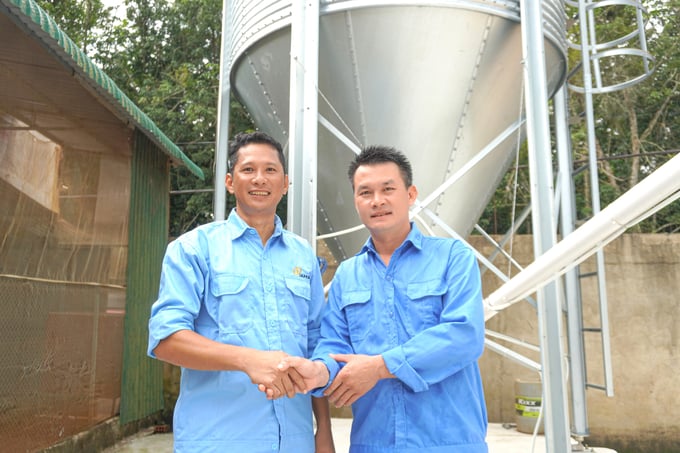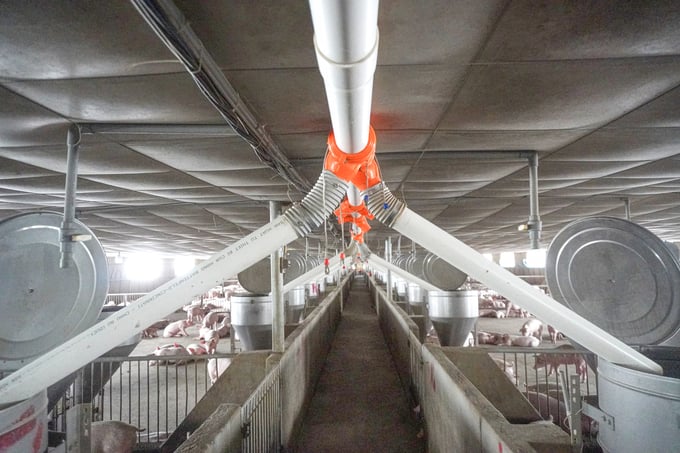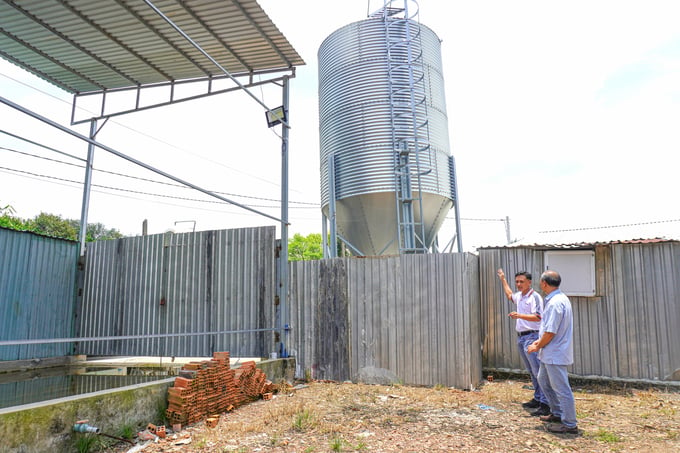May 31, 2025 | 17:44 GMT +7
May 31, 2025 | 17:44 GMT +7
Hotline: 0913.378.918
May 31, 2025 | 17:44 GMT +7
Hotline: 0913.378.918
When they decided to cooperate with Japfa to raise pigs for processing, what Bui Duc Ai and his wife (Doi Chuot Hamlet, Tam Lap Commune, Phu Giao District, Binh Duong province) cared about most was not breeding pigs or feed, but a solution to keep the farm free of African swine fever.
As for the reason, Ai and his wife used to raise pigs for another company. The family's two farms were successively infected with African swine fever. For three consecutive years from 2019 to 2021, the couple was pushed to a miserable state and ran out of capital because of this disease. And to worsen the situation, the company that the couple had a contract to raise pigs for processing did not offer any effective solution to prevent African swine fever.
To escape the risk of losing everything, Ai and his wife had to look for livestock models that could prevent African swine fever more effectively. After researching many different models, the couple decided to put their trust in Japfa's bio-safe livestock farming procedure.

Mai Xuan Tinh (Dray Bhang commune, Cu Kuin district, Dak Lak province) believes that technical support, good breeds and quality animal feed from Japfa will increase the farm’s efficiency. Photo: TL.
To meet the procedure set by Japfa, his family agreed to invest more money, put up 3 layers of biosecurity for the farm and strictly implement measures against African swine fever. In particular, when working with Japfa, the couple always received quick advice and effective instructions from the company's technical staff on biosecurity processes and techniques which helped raise livestock with maximum efficiency.
The company took a step further and created a private group for the couple, including field technicians and high-level managers on a chat application. Through this group, Ai and his wife along with Japfa's technical staff exchanged timely and regularly about the growth status of the pigs, arising problems and how to handle them. Japfa's technical staff and Ai and his wife have experienced many safe pig batches, free of African swine fever. The pigs grow well with a low loss rate and low feed conversion ratio.

Thanks to thorough investment, farms that cooperate with Japfa in livestock processing ensure biosafety conditions and high economic efficiency. Photo: TL.
The bio-safe farming procedure and good support from Japfa are also the main factors that made Mai Xuan Tinh and his wife (Lo 13 village, Dray Bhang commune, Cu Kuin district, Dak Lak province) decide to work with the company and raise pigs for processing.
Chinh - Tinh's wife was a bank employee. While contacting and talking with customers who are livestock farm owners, Chinh gradually became interested in industrial livestock farming. She started researching and learning about the most effective livestock farming models. Finally, she discussed with her husband and chose Japfa's model because it both ensured bio-safety and achieved good economic efficiency.
In 2022, Chinh and Tinh decided to invest in building a cold barn to raise livestock for Japfa. With active support and guidance from the company's technical staff, the couple strictly implemented biosafety procedures for the farm. All rows of barns had ventilation fans and surveillance cameras. Workers must shower, change clothes, wear masks, and go through a disinfection room before entering the farm.

The technical representative of Japfa is discussing with Bui Duc Ai (Tam Lap commune, Phu Giao district, Binh Duong) about solutions to improve biosafety for the family’s farm. Photo: TL.
Since then, with the active and timely support from Japfa's technical staff, Tinh and his wife have achieved certain success after raising five batches of pigs, earning good income per kilogram of weight gain. To enhance biosecurity and reduce production costs at the same time, the company supported his family's farm to install a feed silo system in early July 2024.
Thanks to the silo system, the farm no longer has to worry about outsiders (porters) entering and leaving the farm, leading to the risk of losing biosecurity. This solution also reduces the cost of feed porters. Tinh and his wife steadily feel more confident in their cooperation with Japfa to raise pigs for processing. The couple are planning to open another farm in the near future.
Translated by Samuel Pham

(VAN) Seafood by-products are opening a new path, combining green growth and technological innovation to enhance the industry's value.

(VAN) Mr. Nguyen Thanh Cong, Vice Chairman of the Son La Provincial People's Committee, reflects on Son La’s journey from barren hills to fruitful orchards after a decade of hard work.

(VAN) FAO’s Director-General addresses the 5th Baghdad International Water Conference.
/2025/05/26/1716-4-nongnghiep-191706.jpg)
(VAN) Chain linkages, technological innovation, and raw material zoning are three strategic pillars for the coconut industry to strongly develop and elevate its position on the global agricultural map.
![Advanced mariculture – an inevitable trend: [4] Accompanied by scientists](https://t.ex-cdn.com/nongnghiepmoitruong.vn/608w/files/sohk/2025/05/13/1941-pgsts-vo-van-nha-140958_717.jpg)
(VAN) According to Assoc. Prof. Dr. Vo Van Nha, Director of the RIA III, the development of advanced offshore mariculture is no longer an option but an essential path for Vietnam’s fisheries sector.

(VAN) Vietnam is intensifying the development of mollusk farming areas that meet international standards, aiming for sustainable growth and enhancing its export position in the global seafood market.
![Advanced mariculture – an inevitable trend: [3] Policy-driven momentum](https://t.ex-cdn.com/nongnghiepmoitruong.vn/608w/files/doanhtq/2025/05/21/0104-0616-0348-nuoi-bien-170339_789.jpg)
(VAN) To ensure the success of offshore mariculture that uses advanced technologies, it is essential to establish supportive policies that inspire both individuals and enterprises to invest with confidence.